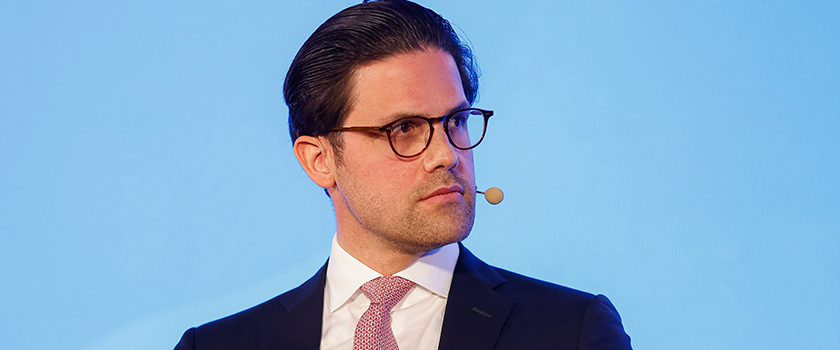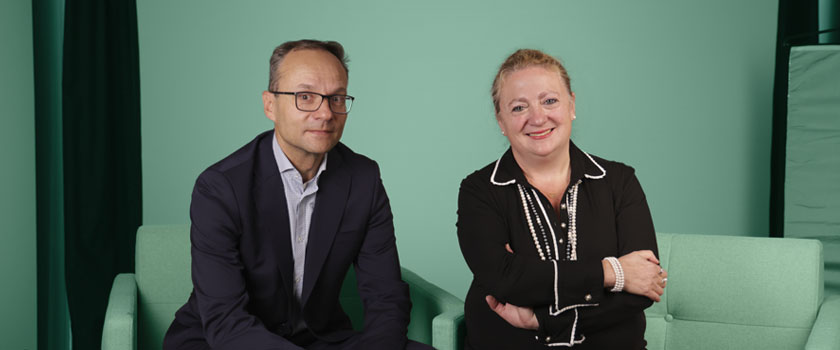Allnews - Emmanuel Garessus (11.09.2023) - As summer comes to an end, the challenge will be to encourage private clients to take on more risk again in their portfolios, says Nicolas Faller, Co-CEO Asset Management at UBP.
Union Bancaire Privée (UBP) has acquired an asset management business in Japan, and stated its intention to strengthen its teams in the press release announcing its first-half results. Nicolas Faller, Co-CEO Asset Management at UBP, spoke to Allnews about these topics, as well as the market outlook and UBP’s development.
How did you deal with the difficult market conditions in the first half of 2023, and how did your assets under management perform?
The first quarter was a fairly tough time for Asset Management, not so much because of the market trend as because of the approach taken by institutional investors. They were drawn to the higher yields offered by investment-grade corporate bonds, and so were less keen to buy equities, hedge funds and private assets. This means that they didn’t allocate much money to asset managers. Private clients also took advantage of attractive risk-free interest rates and often maintained large cash positions. The landscape then changed in the spring, with institutional investors investing more in high-yield and emerging-market bonds, although private clients remained quiet for the most part.
At UBP Asset Management, assets under management rose slightly in the first half because of good inflows in April, May and June. How were the returns from your asset management activities?
We performed fairly well in bonds and Swiss equities – where several of our funds outperformed their indices – and in line with benchmarks in international equities. Outside of emerging markets, we suffered a little in impact funds. However, bear in mind that the investment universe in this space is small and returns can’t really be compared with a global benchmark index. In addition, markets were focused on the tech and luxury goods sectors, which are often absent from impact themes.
As the summer draws to a close, are your clients now more willing to take on risk?
Investors did not sufficiently take advantage of the markets’ strength at the start of the year. In the credit market, portfolios generated decent returns, although the situation was more difficult in terms of duration. Institutional investors are no longer in risk-off mode and are seeking to redeploy capital. The challenge for late summer will be to encourage private clients to take on more risk in their portfolios and come back to equity funds.
Will the market trend be positive in the next few months?
It’s unlikely to be negative in the equity and credit markets. The second half of the year should be fairly good for investors. We need to help them take advantage of the situation, ideally with strategies that allow them to capture the rally while providing some protection in the event of a correction.
Warren Buffett has sold USD 8 billion worth of shares and Michael Burry – the investor behind “The Big Short” – is convinced that a crash is coming. What are the chances that share prices will fall?
We aren’t expecting a crash, because the worst is now over in terms of the interest-rate environment. Short rates may rise a little further, but inflation is starting to come under control. This means that interest rates will be relatively stable. Companies have adjusted well to economic conditions. They have increased productivity and their business models are generally healthy. We’re not in a global recession or market crash scenario.
Historically, you’ve invested a lot in hedge funds. How much of your investments do they represent today?
We’re confident that hedge funds should make up a significant proportion of an investor’s asset allocation. They performed very well last year and their results haven’t been bad in 2023 either. They suffered between 2015 and 2021 because the market was flooded with liquidity, making it more conducive to passive investment than approaches focused on finding market inefficiencies.
Unlike others, we kept our dedicated team in place during that tough period, and we have actually strengthened it in the last two years. It now consists of 26 people and manages USD 16 billion. We’re ideally positioned to advise private clients and institutional investors regarding hedge funds.
We are entering an environment in which liquidity will be in shorter supply. Central banks won’t cut interest rates quickly, even if growth slows. They also have the opportunity to correct an anomaly and to remain focused on their objective of price stability, after being accused of reacting too slowly to inflation as we emerged from the pandemic. In a more volatile and less liquid environment, hedge funds should be able to seize a number of opportunities, especially in global macro funds, credit arbitrage strategies and the long/short equity segment.
The asset management industry seems to be shifting. The takeover bid for GAM, for example, was the story of the summer. Are you tempted to make an acquisition?
We’re not planning to make any major acquisitions in the asset management space. Like everyone else, we looked at GAM, but decided it wasn’t for us. However, we did look at some very specialist outfits in a specific asset class that would give us capabilities we don’t currently offer and that would fit well with our model. This led to our acquisition of Angel Japan AM, a long-standing partner of ours in Japanese small caps, because we think there’s a lot of potential in this area.
Acquisitions in the asset management space are different from those we’ve carried out in private banking. With a private bank, you need to find a good fit, combine skills and offer an attractive platform. If the conditions are right, clients will be inclined to stay loyal to their existing relationship managers. In asset management, however, other factors are involved. For example, there is more overlap in terms of operations. Asset management styles can differ greatly, sometimes excessively so, and require difficult choices to be made. The goodwill lies more with the management teams than with clients, unlike in wealth management.
Historically, acquisitions in the asset management industry have destroyed value more often than they have created it.
So we prefer to make acquisitions in wealth management, although we may still carry out the occasional bolt-on deal in asset management.
Does your acquisition of Angel Japan AM also mean that you expect a sustained rally in Japan?
We know Angel Japan very well indeed. It’s one of the most successful investors in the Japanese small-cap segment over 3, 5 and 10 years. But it didn’t have many clients and it didn’t have any distribution capabilities. The founder wanted to sell up while ensuring the continuity of the business, particularly by retaining its staff and developing its model. It’s a gem of a business, and we can help it grow with our 18-strong team in Japan and our sales teams in Europe. Japanese small caps represent the world’s second-largest market. Small and medium-sized companies are a major driver of Japanese innovation. Many European institutional investors are turning away from Japanese blue chips and focusing on small caps. Angel Japan has CHF 1.3 billion worth of assets under advisory, and this could rise to CHF 4-5 billion.
How has your approach to responsible investment changed?
That depends on what you mean by “change”. We haven’t really changed, but we have strengthened our operation and made it even more professional. We’re confident that ESG and impact investment are much more than a passing fad. But as we saw again in 2022, fossil fuel-related stocks are performing well. So the challenge is to identify what we call “transitioners”, such as oil companies that could change their business models, since a large proportion of their revenue still comes from non-renewable energy sources.
We’re also seeking to improve the way we engage with companies. When a company makes promises regarding its services, we monitor it closely and if it doesn’t live up to those promises, we sell its shares. We also want to manage money for institutional clients seeking net-zero portfolios, and we’re developing our reporting to meet their needs.
Do you have a net-zero target for your investments?
UBP Asset Management has adopted a net-zero target for 2030 and we’re getting close to hitting it, but it doesn’t concern our private client base, which is not yet ready to adopt a similar target. It’s hard to convince our private clients about the importance of managing impact when it means missing out on the returns being generated by the luxury goods sector or certain tech stocks. Institutional clients have always been ahead of the curve in terms of impact and ESG, and will remain so. Investments and capital will increasingly move into the responsible investment space. However, it will take time for this to have a practical impact on money flows and markets. New money in this space was relatively limited in 2022, but we didn’t see any outflows either. Those who have invested in our funds out of conviction are remaining loyal, even though short-term returns have been lower.
Are we at a turning point as regards ESG, at a time when Vanguard and BlackRock are reluctant to follow the ESG proposals of activists in shareholder meetings?
These large passive investors have a business to protect. By definition, if Shell and Total make up 3% of an index, passive investors need to hold their shares in their portfolios. They say that they take an interventionist approach as regards their investees’ boards of directors, but they can’t punish companies that don’t meet their commitments by divesting. We don’t have this problem, because we’re active investors.
In your press release, you say that you’re planning to strengthen your teams. Can you tell us more about this?
Within UBP Asset Management, we take a very opportunist approach and we’re looking to strengthen in various areas. Firstly, we want to bolster our sales teams so that we can sell our full range of products, both in traditional asset classes and alternative investments. We also want to build a sales team specialising in private markets, because sales cycles in that area are very specific. We’ve also developed our asset management teams focusing on emerging markets and impact investing, as well as our reporting teams.
At the Group level, we are still very selective in our strengthening, but nevertheless we’ve recruited more than 150 people since the start of the year, which shows how attractive UBP is as an employer.









